Related Research Articles

Penmetsa Ram Gopal Varma, often referred to by his initials RGV, is an Indian film director, screenwriter and producer, known for his works in Telugu cinema in addition to Hindi, Kannada language films, and television. Varma has directed films across multiple genres, including parallel cinema and docudrama noted for their gritty realism, technical finesse, and craft. Regarded as one of the pioneers of new age Indian cinema, he was featured in the BBC World series Bollywood Bosses in 2004. In 2006, Grady Hendrix of Film Comment, published by the Film at Lincoln Center cited Varma as "Bombay's Most Successful Maverick" for his works on experimental films.

Nagesh Kukunoor is an Indian film director, producer, screenwriter and actor known for his works predominantly in Hindi cinema, and few Telugu films. He is known for his works in parallel cinema, such as Hyderabad Blues (1998), Rockford (1999), Iqbal (2005), Dor (2006), Aashayein (2010), Lakshmi (2014), and Dhanak (2016). Kukunoor has received seven International Awards, and two National Film Awards for his works.
Suddha, also called The Cleansing Rites, is an Indian film, the first-ever Tulu language film shot in the digital format. The 105-minute film was shot in 2004 in a village called Marnad near Mangalore, Karnataka, and was released in 2005. The film is an adaptation of the Tulu Sahitya Academy award-winning Tulu play called Bojja written by Mumbai-based playwright, Narayana Nandalike. Suddha was produced by three Mumbai Tuluvas Mohan Marnad, Surendra Kumar and Ramchandra PN. It was directed by Ramchandra PN, a graduate of the Film and Television Institute of India, Poona. Suddha was his first feature-length film.

Aktan Arym Kubat, also known as Aktan Abdykalykov, is a Kyrgyzstani director, screenwriter and actor. Member of the National Film Academy of the Kyrgyzstan, acting Member of the European Film Academy, acting Member of Asia Pacific Screen Academy.
Parallel cinema, or New Indian Cinema, is a film movement in Indian cinema that originated in the state of West Bengal in the 1950s as an alternative to the mainstream commercial Indian cinema.
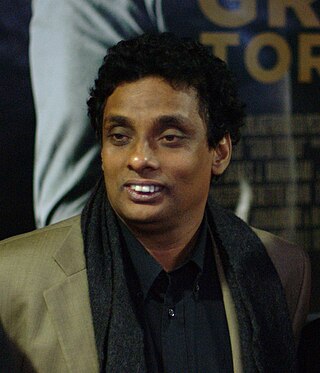
Udaya Prasanna Vithanage is widely regarded as one of the most talented and influential filmmakers in South Asia. He is known for thought-provoking films that often deals with social, political and cultural issues. His films have received numerous awards accolades, both locally and internationally and have been praised for their innovative storytelling.

Layth Abdulamir is an Iraqi-French filmmaker. He studied film in Paris, France, from 1977 to 1980, and in Kiev from 1980 to 1986. Since 1994, he defended his dissertation at the Rylsky National Academy of Sciences of Ukraine,. He received his PHD degree in Cinematic Critic he has made several documentary films for various TV channels in France and for Dubai TV in the United Arab Emirates (1999-2004). In 2021, Layth Abdulamir's book Extreme cinema, transcending the borders of aesthetics was published by Arwegh مؤسسة أروقة للدراسات والترجمة والنشر Editions in Cairo.

Kantatar is a 2005 Bengali film directed by Bappaditya Bandopadhyay, featuring Sreelekha Mitra, Sudip Mukherjee, and Rudranil Ghosh. It received NETPAC Award at Vesoul International Film Festival of Asian Cinema, 2007 for its deceptively simple style with which the complex situation of people trapped in a state of permanent displacement is exposed.
Magunira Shagada is a 2002 India Odia film directed by Prafulla Mohanty. It is based on a short story by Godavarish Mahapatra. The film won the 2002 National Film Award for Best Feature Film in Odia.

Onir is an Indian film and TV director, editor, screenwriter and producer. He is best known for his film My Brother…Nikhil, based on the life of Dominic d'Souza, was one of the first mainstream Hindi films to deal with AIDS and same-sex relationships.

Grain in Ear is a 2005 Chinese film written and directed by Korean Chinese filmmaker Zhang Lu. The title refers to the solar term in the traditional calendars of China and Korea.
Manish Jha is an Indian film writer and director, known for the film Matrubhoomi.
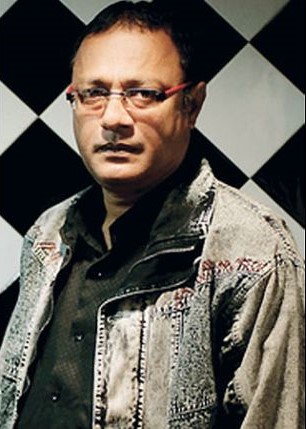
Anjan Das was an internationally acclaimed National Awardwinning film director, screenwriter, and producer known for his contribution to Indian parallel cinema. His films were designated as 'poetry on celluloid', a descriptor used by the critics post his lyrical masterpiece 'Saanjhbatir Rupkathara'. His films won 11 BFJA awards and were regularly showcased at A-list film festivals like BFI London, Rotterdam, IFFI, Brisbane, etc.
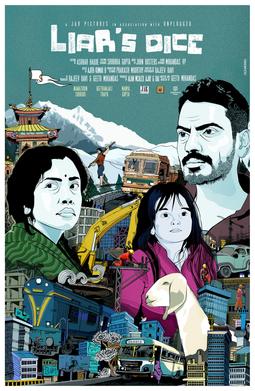
Liar's Dice is a 2013 Indian Hindi-language road movie written and directed by Geetu Mohandas and starring Geetanjali Thapa and Nawazuddin Siddiqui. The film tells the story of a young mother from a remote village who, going in search of her missing husband, goes missing herself. The film examines the human cost of migration to cities and the exploitation of migrant workers.
Zhang Lü is a Chinese filmmaker. Zhang was originally a novelist before embarking on a career in cinema. His arthouse films have mostly focused on the disenfranchised, particularly ethnic Koreans living in China; these include Grain in Ear (2006), Desert Dream (2007), Dooman River (2011), Scenery (2013), and Gyeongju (2014).
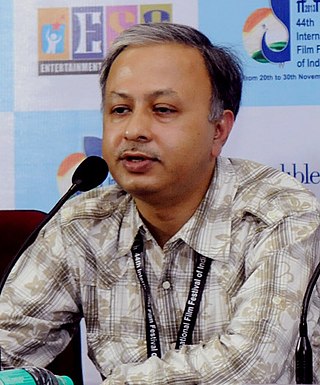
Utpal Borpujari is a double National Film Award winner; one, as a film critic, and the other, as a filmmaker. In 2003, he won the Swarna Kamal for Best Film Critic at the 50th National Film Awards of India. In 2018, he won the National Film Award, and 5 Assam State Film Awards for his debut feature film Ishu
Jahar Kanungo is an Indian film and documentary director and producer in Bengali. He is also a story writer and his debut movie is Nisshabd released in 2005.
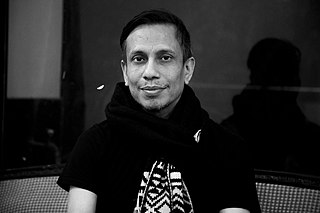
Santanu Bose is an Indian-theatre director and drama teacher. He has worked extensively on multicultural issues in collaborative process. He is the dean of the academic affairs and associate professor, World Drama of National School of Drama, (NSD) New Delhi.

Widow of Silence is an Indian drama film directed, written and produced by Praveen Morchhale who has been hailed by critics as an important filmmaker of the Indian new wave. The film stars Ajay Chourey, Shilpi Marwaha, Bilal Ahmad, and Noorjahan. It was released on 9 December 2018.
Yalkin Tuychiev, also written Elkin Tuychiev, Yolqin Tuychiev, Yolkin Tuychiev, Yolqin Toʻychiyev, is a filmmaker from Uzbekistan. He is known for the award-winning films 2000 Songs of Farida (2020) and P.S. (2010), and both directs films and writes the scripts for them.
References
- ↑ ""Nisshabd": A feature film with an unusual storyline". The Hindu . 19 July 2005.[ dead link ]
- ↑ "Nisshabd (Reaching Silence)". dubaifilmfest.com.
- ↑ "Concluding the claim over 'Nisshabd' with 'No Words'". lexology.com. 11 July 2017.
- ↑ "Awards". IMDb .